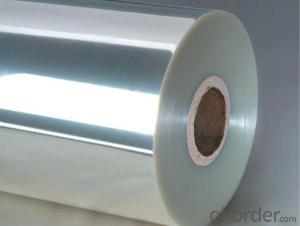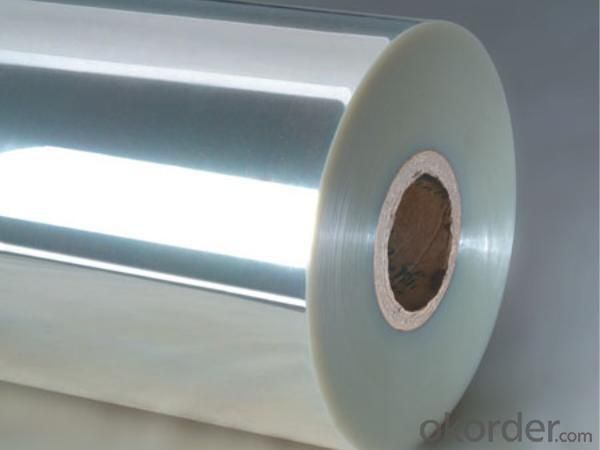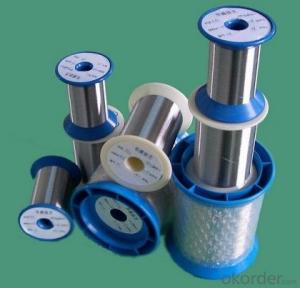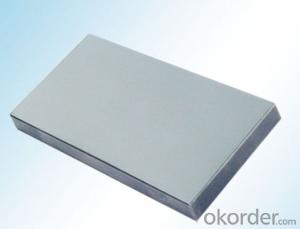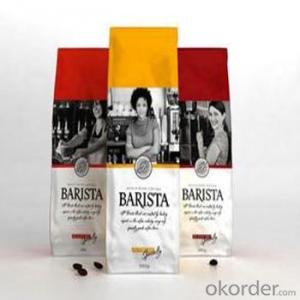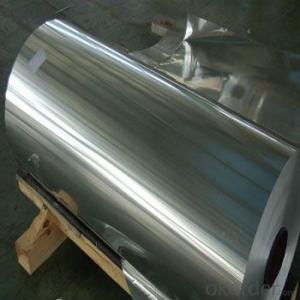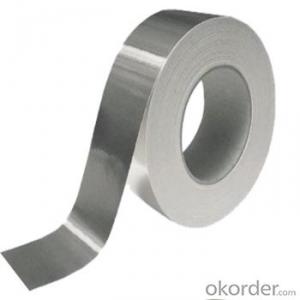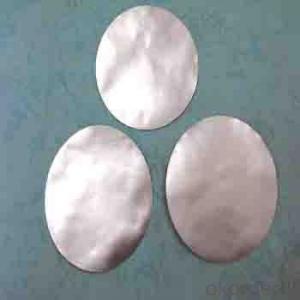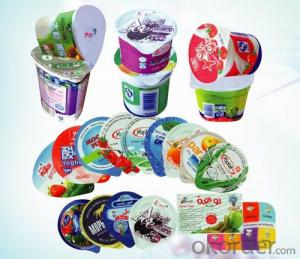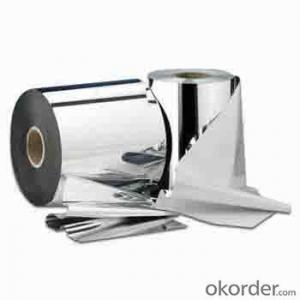Rpr Aluminum Sheets for High-Quality Yogurt Lid Dairy Package Alu Foil
- Loading Port:
- Shanghai
- Payment Terms:
- TT OR LC
- Min Order Qty:
- 1 m.t.
- Supply Capability:
- 1000 m.t./month
OKorder Service Pledge
OKorder Financial Service
You Might Also Like
Specification
1.Specification
lidding foil lidding foils USING ALUMINIUM
Alloy: 8006/8011/8079
Temper:O
Thickness& Tolerance: 0.03mm-0.05mm(±5%)
Width& Tolerance: 200mm-1650mm(±1mm)
Mechanical Properties: Tensile Strength (U.T.S)≥50Mpa, Elongation≥1%
Standard: GB/T3198 /ASTM-B209/EN546
2.Application
Application: Lid of yogurt package, dairy package
3.Detailed Description
Physical
Aluminium is a relatively soft, durable, lightweight, ductile and malleable metal with appearance ranging from silvery to dull gray, depending on the surface roughness. It is nonmagnetic and does not easily ignite. A fresh film of aluminium serves as a good reflector (approximately 92%) of visible light and an excellent reflector (as much as 98%) of medium and far infrared radiation. The yield strength of pure aluminium is 7–11 MPa, while aluminium alloys have yield strengths ranging from 200 MPa to 600 MPa.Aluminium has about one-third the density and stiffness of steel. It is easily machined, cast, drawn and extruded.
Aluminium atoms are arranged in a face-centered cubic (fcc) structure. Aluminium has a stacking-fault energy of approximately 200 mJ/m2.
Aluminium is a good thermal and electrical conductor, having 59% the conductivity of copper, both thermal and electrical, while having only 30% of copper's density. Aluminium is capable of being a superconductor, with a superconducting critical temperature of 1.2 Kelvin and a critical magnetic field of about 100 gauss (10 milliteslas).
Chemical
Corrosion resistance can be excellent due to a thin surface layer of aluminium oxide that forms when the metal is exposed to air, effectively preventing further oxidation.The strongest aluminium alloys are less corrosion resistant due to galvanic reactions with alloyed copper.This corrosion resistance is also often greatly reduced by aqueous salts, particularly in the presence of dissimilar metals.
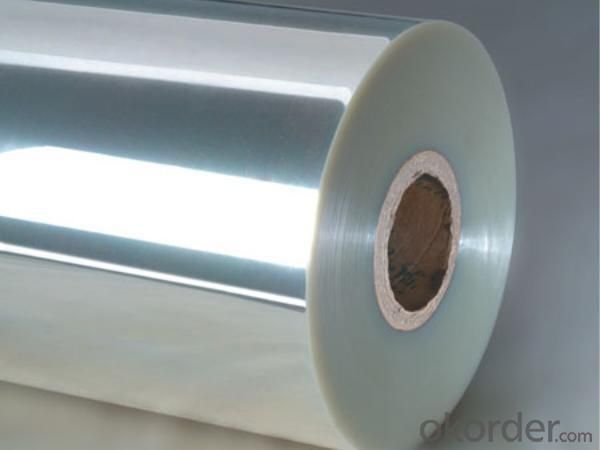
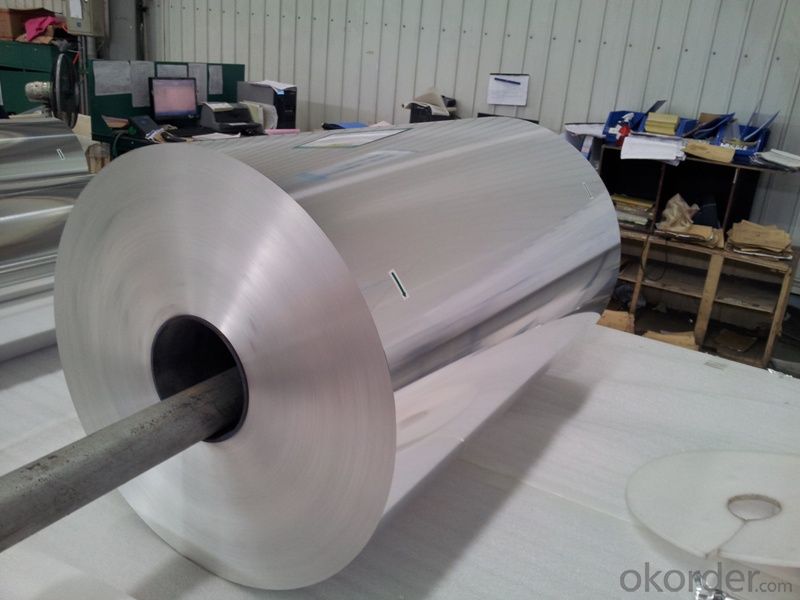
- Q: How do 101 aluminum sheets compare in terms of strength and durability?
- 101 aluminum sheets are known for their excellent strength and durability properties. They offer a high level of resistance to corrosion, making them suitable for various applications in industries such as automotive, construction, and aerospace. Additionally, their strength-to-weight ratio is impressive, allowing for efficient use in structures where weight reduction is essential. Overall, 101 aluminum sheets are considered strong and durable materials with a wide range of practical uses.
- Q: What are the different forming techniques for aluminum sheets?
- Aluminum sheets can be shaped using several different forming techniques. One technique commonly used is bending, where force is applied to the sheet to achieve the desired shape. This can be done manually with a press brake or through automated processes like roll forming or stretch forming. Another technique, called deep drawing, involves using a die and punch to stretch the aluminum sheet into a three-dimensional shape. This method is often employed to create cylindrical or box-shaped components such as cans or containers. Hydroforming is another option for shaping aluminum sheets. It utilizes hydraulic pressure to mold the sheet against a form or mold. This technique is particularly useful for creating complex and irregular shapes that would be challenging to achieve with other methods. For creating symmetrical shapes like bowls or cones, spinning is a commonly used technique. It entails rotating the aluminum sheet against a mandrel while applying pressure to shape it into the desired form. Lastly, there is a technique known as stamping, which involves pressing the aluminum sheet against a die to create a specific shape. This technique is frequently employed in high-volume production of components such as automotive body panels. In conclusion, these forming techniques provide a wide range of options for shaping aluminum sheets into various forms and designs. This allows for flexibility and versatility in manufacturing processes.
- Q: How do i prepare the aluminium sheet to paint with oils on it?Do I have to buy special aluminium or any kind will work?
- Prep and clean with vinegar
- Q: How to mix solid aluminium sheet with solid copper sheet (using heat?) to make a compound.
- As copper and aluminum are both metals and both have positive charges, you can not form a compound with them. You can, however, create an alloy out of them.
- Q: Hello, I dont really know anything about using a drill or cutting through metal or wood. the thing is I have a project in which I have to drill some holes in 0.04in aluminum. but I really dont know if can use regular drill bits used for drilling wood to drill the holes in my aluminum chassis. do I need to buy other drill bits for cutting metal or can I use the same ones Ive seen used for cutting wood? can I even use the same kind of drills, or do I NEED a huge bench drill with stepper bits?thanks
- Aluminum is softer than steel, so you could just use the ordinary bits that you use for wood, with a hand drill. For cleaner holes, you might want to put wood behind the aluminum as a backing. Also, if you squirt a drop of oil onto the drill area, that will help. If you're trying to drill a really large hole, it might be better to drill small ones, and enlarge with a round file.
- Q: Are the aluminum sheets suitable for manufacturing solar panel backings?
- Aluminum sheets, indeed, prove to be a fitting choice for the production of solar panel backings. With its exceptional properties, aluminum has gained significant popularity in the solar industry. Its lightweight nature, durability, and resistance to corrosion make it highly suitable for outdoor applications. Furthermore, aluminum exhibits a remarkable ability to conduct heat effectively, a critical factor for ensuring the efficient operation of solar panels. Moreover, the recyclability of aluminum makes it an environmentally conscious option for solar panel manufacturing. All in all, aluminum sheets serve as an appropriate material for the fabrication of solar panel backings.
- Q: I saw a nice looking set of cast aluminum pots for a very good price. They feel very heavy. But I remember hearing that aluminum is not healthy so I am wary of buying them. Any advice would be appreciated.
- A lot of aluminum pots these days have a teflon coating. If the pot is plastic-coated, then you won't get any aluminum from it Twenty years ago, there were concerns about aluminum pots because of the aluminum content of alzheimer clumps. But aluminum intake was cleared from worries about alzheimer -- the clumps gather aluminum rather than vice versa. I'm not aware of any more recent health concerns. The first link below claims that the anodizing process that hardens the surface of the pot, also locks in the metal so that none gets into the food. In the second link, Planet Grean (part of Discovery Channel) says that you're allowed 50 milligrams per day, and even using non-anodized aluminum cookware would give you five or six. But they say not to cook acidic foods, store food in the pot, or keep using the pot after a major scratch in the hardened surface. In the third link, Treehugger (also part of the Discovery empire) says that you get more aluminum from your drinking water than from aluminum cookware. (Alum is used to settle sediment in big-city water supplies.)
- Q: How do you form curves or shapes in aluminum sheets?
- There are several methods to form curves or shapes in aluminum sheets. One common technique is called bending, where the sheet is clamped and then gradually bent using a mechanical press brake or a hammer. Another method is called roll forming, which involves passing the aluminum sheet through a series of rollers to achieve the desired shape. Additionally, aluminum sheets can be molded or pressed into curves or shapes using specialized tools or dies.
- Q: What is the elongation of aluminum sheets?
- The elongation of aluminum sheets denotes the extent to which the sheets can stretch or deform before breaking or tearing. It serves as a gauge of the material's ductility or its capability to elongate without fracturing. The elongation of aluminum sheets may differ depending on variables like alloy composition, tempering, and manufacturing techniques employed. As a general rule, aluminum sheets exhibit a notable elongation percentage, ranging from 15% to 40%. This implies that they can be bent, shaped, or stretched to a certain degree without compromising their structural integrity. The elongation of aluminum sheets emerges as a vital characteristic to contemplate in scenarios where the material must endure deformation or be molded into intricate forms.
- Q: Can aluminum sheet be used for electrical grounding applications?
- Indeed, aluminum sheet finds utility in electrical grounding applications. It possesses remarkable conductive properties, rendering it apt for employment in grounding systems. Its low resistance and exceptional electrical conductivity make it a common choice in diverse electrical applications. With the capability to proficiently transport electrical current and securely disperse it into the ground, aluminum sheet guarantees the safeguarding of electrical systems and averts potential electrical dangers. Moreover, the lightweight and corrosion-resistant attributes of aluminum establish it as a favored option for grounding applications across numerous industries, encompassing construction, automotive, and aerospace.
Send your message to us
Rpr Aluminum Sheets for High-Quality Yogurt Lid Dairy Package Alu Foil
- Loading Port:
- Shanghai
- Payment Terms:
- TT OR LC
- Min Order Qty:
- 1 m.t.
- Supply Capability:
- 1000 m.t./month
OKorder Service Pledge
OKorder Financial Service
Similar products
Hot products
Hot Searches
Related keywords
